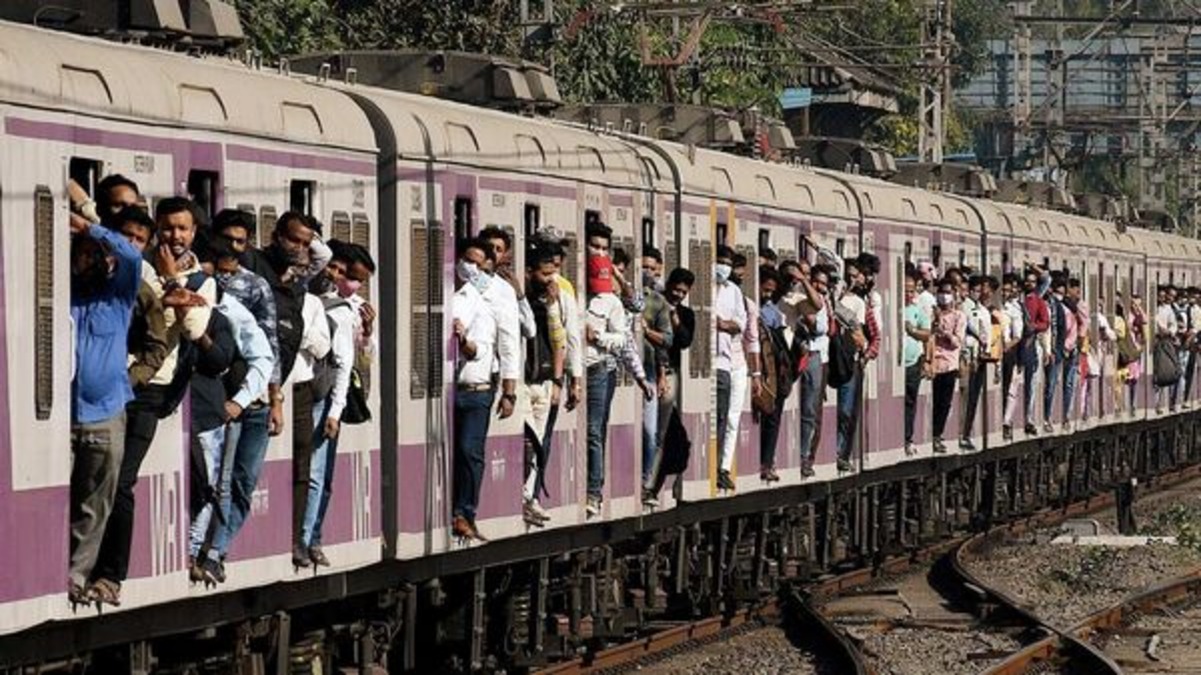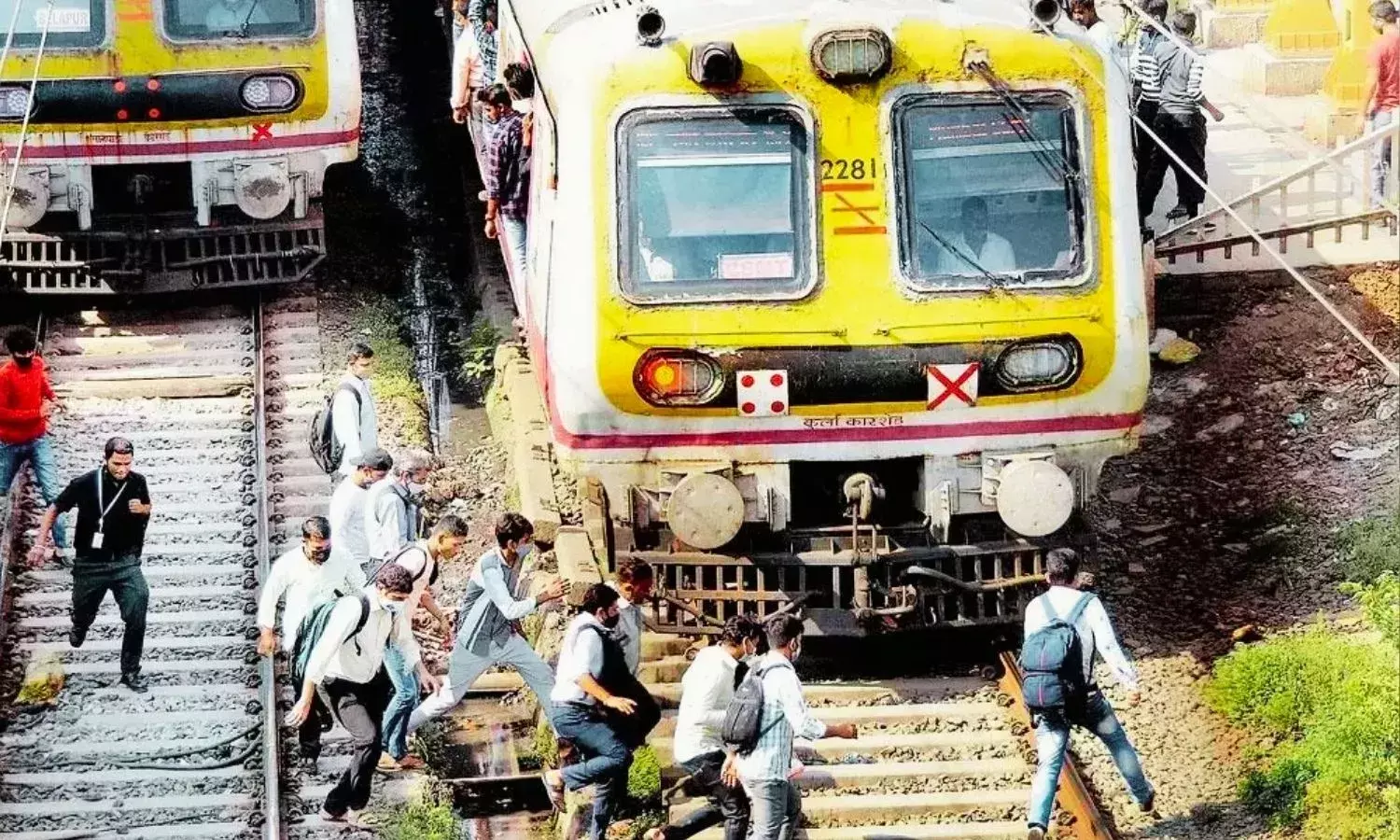On the morning of June 9, 2025, a devastating accident near Mumbai’s Mumbra railway station claimed the lives of four commuters and injured nine others. The incident, which occurred during peak rush hour, saw passengers fall from an overcrowded local train traveling between Diva and Mumbra stations. This tragedy has reignited urgent discussions about the chronic issue of overcrowding on Mumbai’s suburban railway network, a system that serves as the lifeline for millions but continues to exact a heavy human toll.
)
A Fatal Rush Hour
Around 9:30 AM, two local trains—one heading toward Chhatrapati Shivaji Maharaj Terminus (CSMT) and another toward Kasara—passed each other on adjacent tracks. Overcrowding forced many passengers to cling to the footboards, a common but dangerous practice during Mumbai’s chaotic peak hours. As the trains navigated a sharp curve, passengers on the footboards of both trains collided, causing several to lose balance and fall onto the tracks. The victims, identified as Ketan Saroj (23), Rahul Gupta (27), Vicky Mukhyadal (34), and Mayur Shah (44), were among the 13 who fell, with four succumbing to their injuries.
Eyewitnesses described a scene of chaos, with the sudden jerk of the train and the narrow gap between the passing trains exacerbating the danger. Swapnil Dhanraj Nila, Chief Public Relations Officer of Central Railway, noted that the bags of commuters on the footboards likely brushed against each other, triggering the fatal loss of balance. This incident underscores a grim reality: Mumbai’s trains, carrying nearly 7.5 million passengers daily, are stretched far beyond their capacity, turning routine commutes into life-threatening journeys.
Overcrowding: A Persistent Crisis

Mumbai’s suburban railway, one of the busiest in the world, operates at a staggering 400% of its intended capacity during peak hours. A 12-car rake, designed to carry 1,800 passengers, often holds over 8,000, leaving commuters with no choice but to hang precariously from open doors. In 2024 alone, 2,468 people died on Mumbai’s suburban tracks, with 570 fatalities attributed to falls from overcrowded trains. Over the past 20 years, more than 51,000 lives have been lost, averaging seven to eight deaths daily.
The Diva-Mumbra stretch, where the accident occurred, is notorious for its overcrowding and sharp curves, which amplify risks. Commuter Anand Maruti Patil had warned the Railway Ministry in February 2025 about the dangers of coaches tilting on this route, but no action was taken. The Mumbai Railway Passengers Association also highlighted that prioritizing express trains over local services on the Diva-Kalwa route has worsened congestion, a grievance ignored by authorities.
Systemic Failures and Neglected Warnings

The Mumbra tragedy is not an isolated incident but a symptom of systemic failures. Despite repeated calls for reform, issues like inadequate infrastructure, insufficient train frequency, and poor crowd management persist. Activists like Samir Zaveri have long advocated for a cyclic timetable to reduce passenger loads by 30–40%, a solution that could save lives without additional costs. Yet, such proposals remain unimplemented.
The Bombay High Court was informed in 2024 that 51,802 deaths occurred on Mumbai’s suburban lines over two decades, with Central Railway alone reporting 29,321 fatalities since 2009. Causes range from falls due to overcrowding to track-crossing accidents, yet progress on safety measures has been slow. A slewing operation to adjust track geometry between Sion and Kurla reduced similar accidents, raising questions about why such interventions weren’t applied to the Diva-Mumbra stretch.
A Step Toward Safety: Automatic Doors
In response to the tragedy, Indian Railways announced that all new rakes for Mumbai’s suburban network will feature automatic door-closing mechanisms, with existing rakes to be retrofitted. This measure aims to prevent passengers from falling through open doors, a recurring hazard. While a welcome step, critics argue it’s overdue and insufficient without addressing the root cause: overcrowding.
Sharad Pawar, a prominent political leader, emphasized the need for more trains and rakes to ease congestion, urging authorities to prioritize capacity over blaming commuters. The decision to introduce automatic doors follows years of advocacy, but its implementation timeline remains unclear, leaving commuters vulnerable in the interim.
The Human Cost
The victims of the Mumbra tragedy were ordinary Mumbaikars, each with dreams and families. Rahul Gupta, a 27-year-old delivery boy, boarded a delayed train at Diva, where a surging crowd contributed to the accident. Mayur Shah, a 44-year-old IT engineer, was possibly house-hunting before heading to work. Ketan Saroj, a 23-year-old call center employee, and Vicky Mukhyadal, a 34-year-old policeman, were also among the fallen, their lives cut short by a system that failed them.
Families expressed grief and frustration. Rammilan Gupta, a relative of Rahul, blamed train delays for the deadly overcrowding, while Santosh Doshi, Mayur Shah’s brother-in-law, mourned the loss of a man supporting his aging mother. These stories highlight the human toll of a crisis that statistics alone cannot capture.
A Call for Urgent Reform
The Mumbra train tragedy has sparked outrage and renewed demands for accountability. Maharashtra Chief Minister Devendra Fadnavis called the incident “extremely unfortunate” and ordered an inquiry, while Deputy Chief Minister Eknath Shinde assured support for victims’ families. Political leaders like Aditya Thackeray and Harshavardhan Sapkal criticized the government’s focus on projects like the bullet train while neglecting local train safety.
Mumbai’s suburban railway is the city’s backbone, but its deadliness—claiming over 45,250 lives since 2009—demands immediate action. Solutions like increasing train frequency, implementing staggered office timings, and upgrading infrastructure are critical. The Central Railway’s affidavit to the Bombay High Court suggested removing encroachments and regulating sand mining near tracks, but these measures require swift execution.
Moving Forward
The Mumbra tragedy is a stark reminder that Mumbai’s commuters deserve better. While automatic doors are a step forward, they must be part of a broader strategy to tackle overcrowding and enhance safety. For millions who rely on these trains daily, the cost of inaction is measured in lives lost. As Mumbai grapples with this latest loss, the question remains: will this be the wake-up call that finally drives meaningful change, or will the city’s lifeline continue to claim its passengers?
Last Updated on: Tuesday, June 10, 2025 12:07 pm by Rishi Akkaraju | Published by: Rishi Akkaraju on Tuesday, June 10, 2025 12:05 pm | News Categories: News, India
